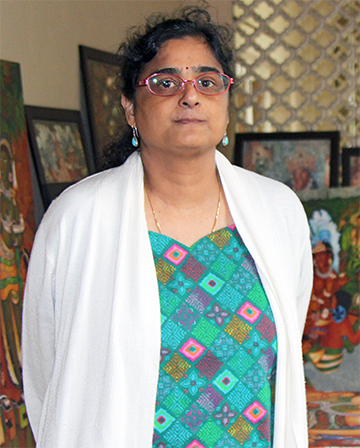
Uma Maheswari Rajagopalan
In this installment of Senior Member Insights, OPN talks with Uma Maheswari Rajagopalan, a professor in the Department of Mechanical Engineering, Shibaura Institute of Technology, Tokyo, Japan. After receiving her master’s in physics from The American College, Madurai, and her master’s in applied optics from the Indian Institute of Technology, New Delhi, India, she got her Ph.D. in engineering from Hokkaido University. She also holds a master’s degree in education specializing in applied linguistics from Open University, United Kingdom.
During her research career, she worked in different institutes within Japan. As a research scientist at the Brain Science Institute (BSI), RIKEN, Japan, she proposed and implemented optical coherence tomography (OCT) for live imaging of brain functions and succeeded for the first time in the world. Her research interests include applying optical technology to biology and cognitive neuroscience, along with genre-based pedagogical approaches to teaching English to non-native students majoring in science and technology. She is currently researching the application of laser speckle-based measurement and OCT technologies to determine the shelf life of fruits; environmental stress, including microplastic stresses on plant growth; plant-sound interactions; and wearable brain imaging technologies in attention and memory studies.
What first interested you in pursuing science?
Of all the sciences, physics attracted me for its reasoning. When I entered college, I was rather attracted to becoming a bureaucrat, to be directly involved in society, which changed on entering my graduate school. I was drawn into the beauty and elegance of physics, especially optics, which drove me to specialize in optical technology.
What aspect of your current work do you find the most interesting or exciting?
Although I majored in physics with a specialization in optics, my current work covers applying optical technology to plant science and environmental disciplines, cognitive neuroscience, brain imaging, and applied linguistics. My involvement in interdisciplinary research is challenging and exciting, making me a lifelong learner and, thus, ever younger.
What tips for successful networking do you have for early-career professionals?
Of course, conferences are the best way to interact, which provides a great way to contact experts directly. Networking resources such as LinkedIn and ResearchGate could also be an excellent way to connect to the research community.
What professional resources do you rely on to stay active and engaged with your field?
Because of the information explosion, the choice of authentic sources is all the more critical. For optics, Optics & Photonics News and other freely available resources such as Biophotonics and Laser Focus World could be a great way to be abreast of the advancements. I also subscribe to receiving TOC alerts from different journals that provide me with the latest research activities.
What skills do you think are most important for someone interested in a career like yours?
In my view, coding skills are crucial in current times. Other than that, it is necessary to be proficient in developing skills in communication—both speaking and writing. The research could be superb, but without proper communication, it would be a waste.
What advice do you have for young scientists who are discouraged about their current work or career path?
My advice is to persevere and have an open mind. Unfortunately, I had many setbacks that nearly destroyed my research career. As a result, I had to take a detour to teach the English language, which made me realize the importance of communication.
What piece of advice that you got as a student, or early in your career, was especially valuable?
When I was a student, the important advice I got was not to take anything for granted but to critically question and look at the concepts. I used to have sessions where students needed to prepare questions in advance before the class. This practice, in a way, laid the foundation for my later career.
What has been the most motivating factor throughout your career?
The passion and thirst for knowledge are my energy sources, despite deterrence from physical aging and health setbacks.
What habits do you frequently rely on that help you to succeed?
I frequently rely on contemplation, meditation exercises, and listening to audiobooks from a different genre, including popular-science and spiritual books.
If your ten-years-younger self was looking at your career now, what would she be most surprised by?
She would be surprised at my perseverance of never wanting to give up and would be amazed at herself being still in an active research career.
